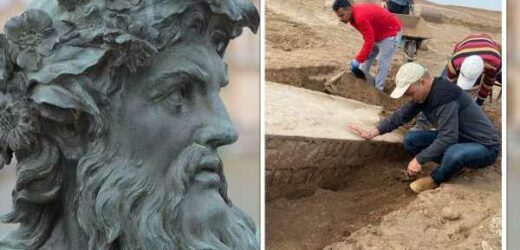Egyptian skeleton shows traumatic injury before death
We use your sign-up to provide content in ways you’ve consented to and to improve our understanding of you. This may include adverts from us and 3rd parties based on our understanding. You can unsubscribe at any time. More info
The discovery was made at the Tel Farma site in the Northern Sinai archets region. Also known by its ancient name Pelusium, the area dates back to the late Pharaonic period and was also used during Greco-Roman times. Mostafa Waziri, secretary-general of Egypt’s Supreme Council of Antiquities, said experts excavated the ruins, which included two huge fallen granite columns.
They were said to mark a gate entrance to the temple, known as Zeus-Kasios, that was destroyed in a powerful earthquake in ancient times.
They also uncovered granite blocks that are believed to have been used as a staircase for worshipers to reach the temple.
Excavations at the area date back to early 1900 when French Egyptologist Jean Clédat found ancient Greek inscriptions that showed the existence of the Zeus-Kasios temple.
He was unable to locate it though.


Researchers say the temple’s name takes inspiration from Zeus, the God of the sky in ancient Greek mythology, and Mount Kasios in Syria, where Zeus once worshipped.
They also found inscription evidence that the temple was renovated by the Roman Emperor Hadrian.
Hisham Hussein, the director of Sinai archaeological sites, said experts will study the unearthed blocks and do a photogrammetry survey to help determine the architectural design of the temple.
It comes just a week after archaeologists uncovered the remains of a huge Roman-era complex near Alexandria.

The Egyptian team unearthed evidence of an ancient pottery workshop, with the remains of rounded vessels, coins, figurines and even a “ritual room”.
The experts say the site dates to the Roman period of Egypt’s history, which began around 30BC, but there is also evidence that points to its use during the later Byzantine period.
Also uncovered at the site were two burials – including a pregnant woman – that are believed to date from the later Middle Ages.
DON’T MISS:
Putin shoots himself in foot after cutting gas to Bulgaria [ANALYSIS]
Putin’s energy threats backfire as 38 million barrels of oil go unsold [REPORT]
UK to send terrifying new missiles that can WIPE OUT Putin’s ships [INSIGHT]


There is evidence of up to 100 graves, which the team will not continue to probe.
Dr Salima Ikram, professor of Egyptology at the American University in Cairo, said: “Alexandria was very significant during the Ptolemaic era because it was founded by Alexander the Great.
“It is wonderful to have a whole industrial section of the ancient city, as it tells us about the daily workings of Alexandria, its people and its economy.”
Source: Read Full Article


